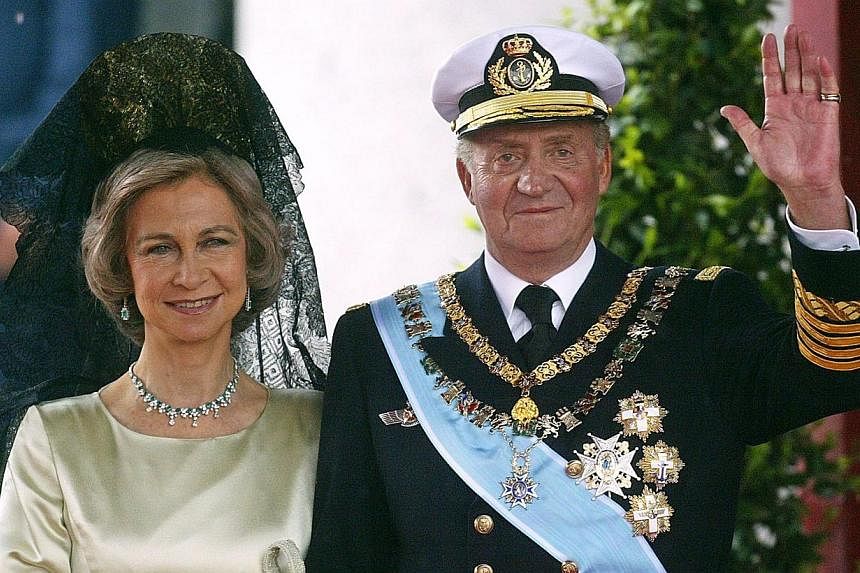|
MADRID (AFP) - Spain's King Juan Carlos announced on Monday that he will hand over the crown to his son Prince Felipe, ending a 39-year reign that guided Spain from ctatorship to democracy but was later weakened by scandals.
The 76-year-old, crowned in November 1975 after the death of General Francisco Franco, said he wanted to hand over to "a younger generation" after several turbulent years in Spain.
King Juan Carlos was well liked for decades, but discontent over the country's economic crisis and a corruption scandal embroiling his family hurt his popularity.
Years of economic crisis "have awakened in us a desire for renewal, to overcome and correct mistakes and open the way to a decidedly better future", he said in a televised address.
"Today a younger generation deserves to step into the front line, with new energies," said the king, dressed in grey suit and green tie. "For all these reasons... I have decided to end my reign and abdicate the crown of Spain."
King Felipe VI
Spain's new king will be his son Felipe de Borbon, Prince of Asturias, a 1.98-metre tall former Olympic yachtsman. He has been relatively unscathed by the family's scandals.
The future King Felipe VI "embodies stability, which is the mark of identity of the monarchy," King Juan Carlos said.
"The prince of Asturias has the maturity, the readiness and the sense of responsibility needed to take on with full guarantees the leadership of the state and open a new phase of hope."
More reserved than his jovial father, Prince Felipe has nonetheless gained support as his father's image has suffered.
A corruption scandal implicating his youngest daughter Cristina and her husband Inaki Urdangarin have plunged the palace into crisis.
Ex-newsreader queen
The prospect of the king's son Prince Felipe, 46, taking over, with his former newsreader wife Letizia as queen, seemed like a fresh start to passers-by on the streets of Madrid on Monday.
"It was something that clearly had to happen," said Maria Jose Gonzalez, 55, from the northwestern region of Galicia.
"The king is elderly. Felipe is very prepared and will do very well."
In a poll published in January 2014 by centre-right newspaper El Mundo, the number of people with a high opinion of the king fell nine percentage points over 2013 to 41 per cent.
Those wanting him to abdicate in favour of Felipe surged by 17 percentage points to 62 per cent, according to the survey by pollster Sigma Dos.
Some would prefer no king at all. At Spain's frequent anti-government street demonstrations the red, yellow and purple stripes of the old republican flag - a relic of the 1930s - are a common sight.
"I think his time was up, but so is the monarchy's," Alejandro Ricas, a 19-year-old student said of the king, in a street in central Madrid on Monday. "I would like for us Spanish people to be able to choose whether we want a monarchy or a republic. The monarchy is obsolete."
Coup-stopper
King Juan Carlos shaped Spain's modern history when he stepped up as the first crowned head of state in 44 years after Franco's death.
He oversaw the creation of a new system of parliamentary monarchy, with a new constitution approved by referendum in 1978.
He was credited with helping defuse an attempted coup in February 1981 when soldiers stormed into parliament shooting and held lawmakers hostage.
King Juan Carlos said on Monday he had worked to make "citizens the masters of their own destiny and our nation a modern democracy".
"When I look back, I feel nothing but pride and gratitude towards you," he told the nation. "Pride for the many good things we have achieved together over the years, and gratitude for the support you have given me."
Graft probes, sore hips
The king was damaged most of all by the scandal centring on Urdangarin's business affairs, which broked out in 2011 and dragged in Cristina, who was formally named as a suspect this year.
He further angered Spaniards by going on a luxury elephant-hunting safari to Botswana in April 2012 as his subjects struggled in a recession.
His ailing health also raised questions about his future. The king had been looking frailer and spent several months leaning on crutches after a string of operations.
Between May 2010 and November 2013, he had surgery nine times: on a benign lump in his lung, his right knee, an Achilles tendon, a slipped disc, two operations on his right hip and three on his left.
King Juan Carlos was the third European monarch of his generation to abdicate in just over a year.
King Albert II of Belgium, 79, stepped down in July, 2013 after a 20-year reign. Dutch Queen Beatrix, 75, abdicated in April, 2013 after 33 years.
Royal biographer Cesar de la Lama said Juan Carlos had been thinking about abdicating since the start of the year.
"As a king who has abdicated, his stature will increase greatly," he told AFP.
"The Spanish people will never forget all he has done during his reign."
|

